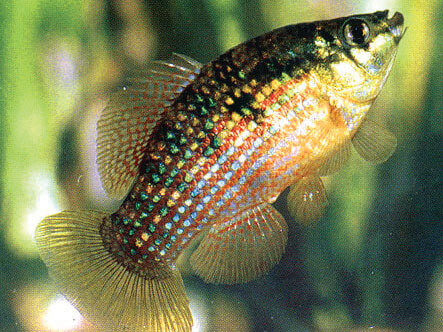An appropriate Florida fish for July, when we celebrate our independence on the Fourth, is the flagfish, also called the American flagfish, a small fish that is usually found only in Florida. It takes its name from the male fish’s resemblance to the American flag: a large black or blue dot and red-and-white stripes on its body that resemble a flag.
The Latin name (“Jordanella floridae”) honors an important zoologist, C. Basil Jordan, who ran a fish research program for the U.S. Fish Commission and for the Smithsonian Institution in the late 1880s. He was also the U.S. Commissioner of Fish and Fisheries, as well as the author of many publications and scientific reports.
The fish, which fish stores sell for aquaria, takes its other common name, “pupfish,” from the seemingly playful mating habits of the male fish, habits that look like puppies at play. The fish were originally found in Florida drainage ponds, as well as the Ochlocknee and St. Johns Rivers. They seem to prefer slow-moving water with a lot of vegetation and are usually found in swamps and marshes. A sharp-eyed observer may see them even in brackish waters, for example in estuaries where river water mixes with seawater.
The small fish, which may grow to only 2 1/2 inches in length, is actually in the Guinness Book of World Records as the fish with the fewest eggs. The fish usually produce only about twenty eggs over a span of several days, although the female fish have been known to lay many more eggs in aquaria, where the fish are very productive at eating algae in the aquaria.
In the wild, flagfish feed on crustaceans, insects, plants, and worms. The males do their part in taking care of the eggs, which the female has laid over algal-covered rocks. The eggs will adhere to the rocks because of a sticky thread that connects the eggs to the rocks. The male adults will guard the newly laid eggs and fan them with their fins in order to keep them clean and aerated. The life span of the fish is two to three years, but – with care – they can live for five years.
This column usually deals with much larger fish, the kinds that can be found in our oceans and rivers, but it seemed appropriate on this Independence Day to honor the American flagfish.
Kevin McCarthy, the award-winning author of “South Florida Waterways” (2013 – available at amazon.com for $7), can be reached at ceyhankevin@gmail.com.
